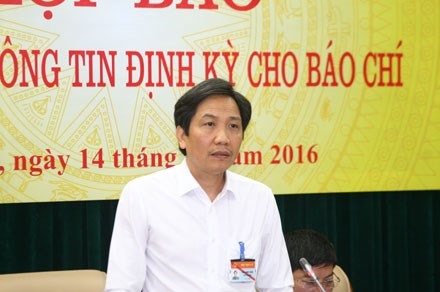.jfif) Opinion
Opinion

Trần Anh Tuấn, Deputy Minister of Labour, Invalids and Social Affairs speaks to the newspaper Thời báo Kinh tế Việt Nam (Việt Nam Economic Times) about the imperative needs to reform the salary system for public employees
 |
Deputy Minister of Labour, Invalids and Social Affairs Trần Anh Tuấn speaks to the newspaper Thời báo Kinh tế Việt Nam (Việt Nam Economic Times) about the imperative need to reform the salary system for public employees.
Việt Nam has conducted its salary reform four times and some people have described that reform process as like “patching a blouse.” If we want to make the reform a success, what should the Government do?
In my opinion, good salary reform must meet the following four criteria.
First, there must be a change of awareness on the role and nature of salaries in the context of a market economy, which is closely linked to administrative reform and that of the public service.
In addition, minimum pay rises should never be considered a reform solution. A pay rise should be interpreted as compensation for an increase in the consumer price index (CPI). Meanwhile, some people have misinterpreted the minimum salary as a basic salary. The increase or decrease of the salaries or wages of people working in production or business is dictated by the market and is competitive. But salaries paid to government officials and public employees are quite different. It is rather stable, but no doubt, is lower than those working for enterprises. Salaries paid to public employees come from tax payers’ money – money from the people and enterprises. In return, public employees have a duty to render good service to the tax payers while the State has a duty to build a rational salary system for government cadres, employees and civil servants.
Second, it is imperative to have a clear definition of salary payments with social insurance contributions; and have a transparent mechanism in the salary policy of self-financing sectors and sectors using the State budget.
Third, salary reform must closely relate to the requirements, solutions and tasks of administrative reform and public service reform. That means the tasks and mission of a salary earner must be described clearly and the enrolment procedures for new recruits must be transparent and accountable.
And last but not least, all government officials, officers and public employees must be able to live on their salaries, and their salaries must be within the payment capacity of the State budget.
Will you please talk a little bit about the Ministry of Interior’s plan to give a pay rise to public employees?
I think it is high time for Việt Nam to adopt a new ideology on salary payments to bring it into conformity with the present conditions and circumstances. This is the first thing we have to do before discussing how to reform the salary system.
In the past, we often thought that salary reform meant raising the basic salary and the focus was mainly on how to have enough money to pay salary earners. However nowadays, to conduct salary reform we also have to reform the social security system while adapting policies for people who have rendered their service to the nation.
In other words, we have to conduct three reforms at the same time. These new requirements will put us in a square position – insufficient money and a mixed up mechanism. That is, public employees receive their salaries; but the principle of contribution and enjoyment dictates social security. Meanwhile, people who have rendered services to the nation attract a special policy of the Party and Government. It is a reflection of our nation’s age-old tradition of “when drinking water, remember the source”.
The current wage payment system in the industrial sector has more advantages than that in the public sector. Can that idea be applied in the public sector?
Market economy solutions only apply in the business or industrial sector. However, some advantages of the industrial sector’s wage payment system could be studied and applied in the public service. However, the wage payment system used in the industrial sector cannot be applied to the monthly salaries of civil servants in the public sector. The reason is very simple; these civil servants volunteer to be at the disposal of the general public and for the nation. This salary system is applied in all government offices nation-wide.
In my opinion, anyone wanting to become a millionaire or earn a high salary should work in the business sector.
If they accept to work in the public sector, the State guarantees to pay them with a rational salary so that they can live and work. And of course, the salary payment can be altered depending on the country’s economic development and the payment ability of the State budget.
However, there are preferential policies to attract talented people to work in the public sector. Coupled with suitable rewards, sanctions will be applied to those who have failed in their work performance. — VNS